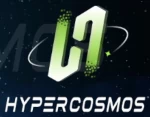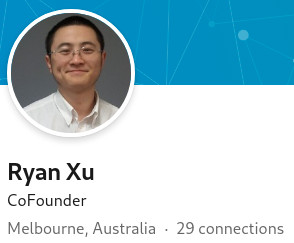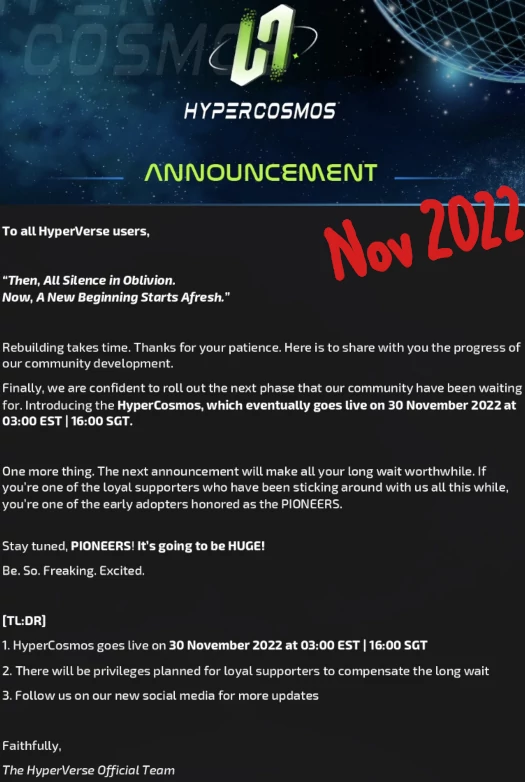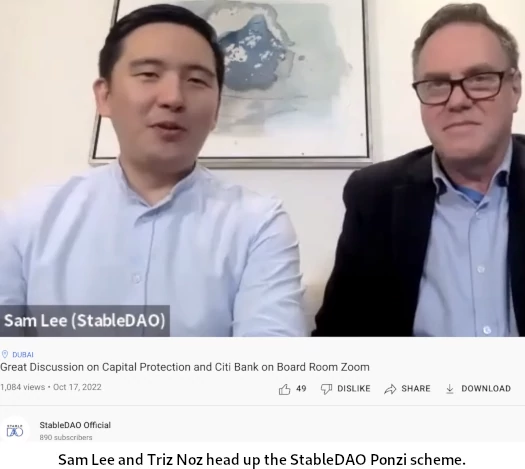
In fact, as I write this, HyperCosmos’ website is nothing more than an affiliate login or signup form.
HyperCosmos’ website domain (“hypercosmos.net”), was registered on November 8th, 2022.
Caden Li is listed as the owner, through a resort address in Dubai. The same details were used to register Hyperverse’s and HyperNation’s website domains.
Whether there’s an actual link between HyperCosmos and the previous Hyper* Ponzi schemes however is unclear. It’s entirely possible whoever is behind HyperCosmos just copy and pasted the domain registration details.
What we can confirm is HyperCosmos is intentionally targeting Hyperverse victims.
The Hyper* series of Ponzi schemes dates back to HyperCash, a collapsed Ponzi scheme launched in 2017.
HyperCash was followed by HyperCapital. HyperCapital was followed by HyperFund. And HyperFund was followed by Hyperverse.
By the time Hyperverse launched in late 2021, the Hyper* series of Ponzi schemes was beyond recovery. Simply put: There was nobody left to scam.
Despite the complete failure of Hyperverse, its collapsed still spawned off two reboots; HyperOne and HyperNation.
SimilarWeb tracks a few hundred thousand hits a month to HyperNation’s website. HyperOne is dead.

Both Xu and Lee fled to Dubai in early 2021. Safe in the MLM crime capital of the world, Sam Lee has been trying to get his StableDAO Ponzi scheme off the ground.
I can’t rule out Lee’s involvement in HyperCosmos, but it seems unlikely seeing as HyperCosmos and StableDAO launched around the same time.
Ryan Xu hasn’t been seen in public since Hyperverse collapsed towards the end of 2021. Whether Xu is involved in HyperCosmos is unclear.
My gut feeling is no. HyperCosmos is probably the same group of scammers running HyperOne and/or HyperNation.
As always, if an MLM company is not openly upfront about who is running or owns it, think long and hard about joining and/or handing over any money.
HyperCosmos’ Products
HyperCosmos has no retailable products or services.
Affiliates are only able to market HyperCosmos affiliate membership itself.
HyperCosmos’ Compensation Plan
HyperCosmos affiliates invest $100 or more in tether (USDT). This is done on the promise of a 300% ROI.
After 300% is reached, new investment is required to continue earning.
The MLM side of HyperCosmos pays on recruitment of new affiliate investors.
HyperCosmos pays referral commissions via a unilevel compensation structure.
A unilevel compensation structure places an affiliate at the top of a unilevel team, with every personally recruited affiliate placed directly under them (level 1):
If any level 1 affiliates recruit new affiliates, they are placed on level 2 of the original affiliate’s unilevel team.
If any level 2 affiliates recruit new affiliates, they are placed on level 3 and so on and so forth down a theoretical infinite number of levels.
HyperCosmos caps payable unilevel team levels at ten. Referral commissions are paid out as a percentage of funds invested across these ten levels as follows:
- level 1 (personally recruited affiliates) – 50%
- level 2 – 4%
- level 3 – 3%
- levels 4 and 5 – 0.5%
- levels 6 and 7 – 2%
- levels 8 and 9 – 0.5%
- level 10 – 2%
Note that how many unilevel team levels referral commissions are earned on is determined by rank:
- recruit 1 affiliate investors = referral commissions on level 1
- recruit 2 affiliate investors = referral commissions on levels 1 and 2
- recruit 3 affiliate investors = referral commissions on levels 1 to 3
- recruit 4 affiliate investors = referral commissions on levels 1 to 4
- recruit 5 affiliate investors = referral commissions on levels 1 to 5
- recruit 6 affiliate investors = referral commissions on levels 1 to 6
- recruit 7 affiliate investors = referral commissions on levels 1 to 7
- recruit 8 affiliate investors = referral commissions on levels 1 to 8
- recruit 9 affiliate investors = referral commissions on levels 1 to 9
- recruit 10 affiliate investors = referral commissions on levels 1 to 10
Consensus Rewards
HyperCosmos takes 5% of company-wide invested funds and places it into “Consensus Rewards” bonus pool.
These pools correspond with recruiting affiliates and getting them to invest:
- Fission A – personally recruit 3 affiliates and have a downline of 200 or more who together have invested at least $100,000 = a share in a 0.5% Consensus Reward pool
- Fission B – personally recruit 4 affiliates and have a downline of 300 or more who together have invested at least $200,000 = a share in a 0.8% Consensus Reward pool
- Fission C – personally recruit 7 affiliates and have a downline of 500 or more who together have invested at least $300,000 = a share in a 1.2% Consensus Reward pool
- Fission D – personally recruit 10 affiliates and have a downline of 1000 or more who together have invested at least $500,000 = a share in a 2.% Consensus Reward pool
HyperCosmos’ marketing material suggests the above criteria must be met on an ongoing monthly basis.
The wording is a bit janky but I also believe invested funds from the strongest unilevel team leg is excluded.
Joining HyperCosmos
HyperCosmos affiliate membership is free.
Full participation in the attached income opportunity requires a minimum $100 investment in USDT.
HyperCosmos Conclusion
Regardless of who’s behind it, HyperCosmos is a simple 300% ROI Ponzi scheme.
Affiliates invest, build a 300% ROI balance and then, if they are able to withdraw, steal subsequently invested funds.
With nothing sold or marketed to retail customers, the MLM side of HyperCosmos constitutes a pyramid scheme.
As with all MLM Ponzi schemes, once affiliate recruitment dries up so too will new investment.
This will starve HyperCosmos of ROI revenue, eventually prompting a collapse.
The math behind Ponzi schemes guarantees that when they collapse, the majority of participants lose money.
I suspect the only people interested in HyperCosmos are going to be Hyper* victims, desperate to recover previous losses.
Once that admittedly large pool of suckers is milked, HyperCosmos will exit-scam like all the previous Hyper* Ponzis.



